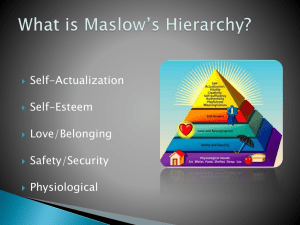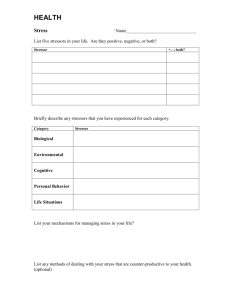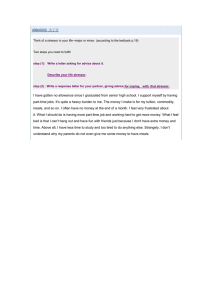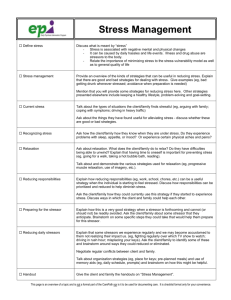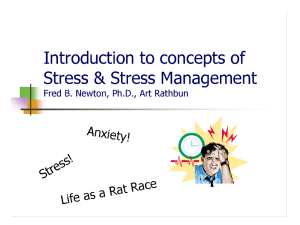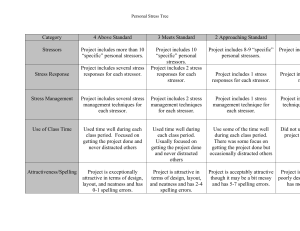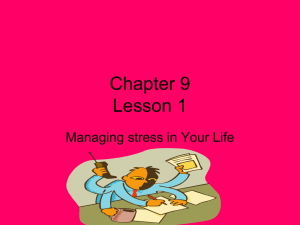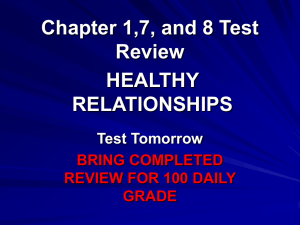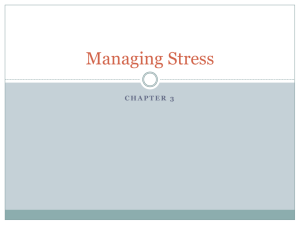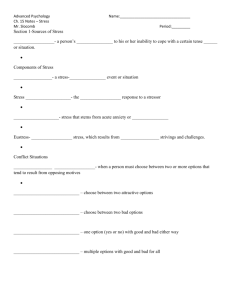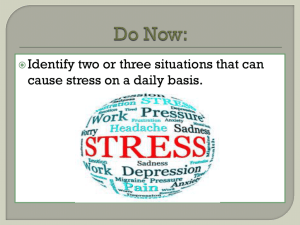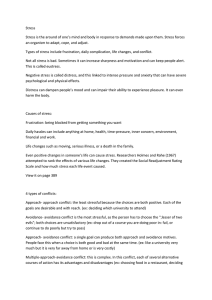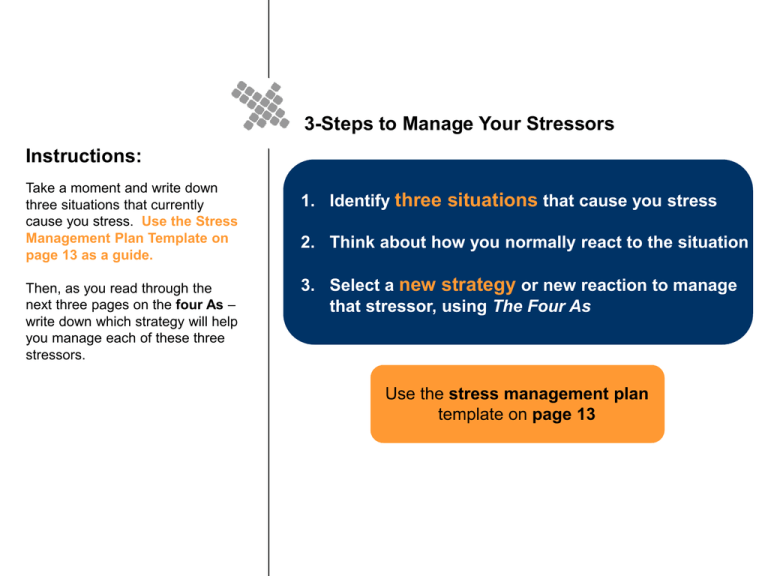
3-Steps to Manage Your Stressors
Instructions:
Take a moment and write down
three situations that currently
cause you stress. Use the Stress
Management Plan Template on
page 13 as a guide.
Then, as you read through the
next three pages on the four As –
write down which strategy will help
you manage each of these three
stressors.
1. Identify three situations that cause you stress
2. Think about how you normally react to the situation
3. Select a new strategy or new reaction to manage
that stressor, using The Four As
Use the stress management plan
template on page 13
Managing Stress
Four Ways of Managing Stress
Learn how to say “no”—In both your personal and professional life,
Avoid
don’t automatically “say yes” to additional responsibilities before considering them.
If you’re not sure you can deliver on a commitment, say:
“I’ll get back to you” Take time to weigh your options and get more detailed
information about the request before agreeing.
“I’d really like to, but…” Explain that you’d like to do whatever your friend, family member, or manager requests;
however, you can’t now - or ever - for specific reasons:
Example: If a friend or family member asks you to go out to dinner when you’re under a time crunch with personal
responsibilities, you may feel badly saying no. However, you can say this: “Going out to dinner sounds like a great idea;
however I’m quite busy right now. Would next week work?" Feel free to propose another time or another idea. For example, you
could propose going out for coffee or eating in, if budget is a concern.
Limit time spent with people who create stress—If someone consistently causes stress in your life
and you haven’t been able to change the relationship, limit the amount of time you spend with him or her. Spend only
the time you need to meet necessary obligations, and if that doesn't work, consider ending the relationship.
Take control of your environment—If the evening news makes you anxious, turn off the TV.
If driving in
traffic makes you tense, consider taking a longer but less-traveled route or changing your driving hours. If going to
stores stresses you out, try to shop online.
Pare down your to-do list—Analyze your schedule, responsibilities, and daily tasks. If you have too much to
do, distinguish between “shoulds” and “musts.” Identify what you enjoy doing and what you simply do out of obligation,
guilt, or habit. Look for ways to eliminate tasks that aren’t necessary.
9
See page 14 for tips on managing your to-do list
© 2009 Corporate Executive Board, All Rights Reserved.
Managing Stress
Four Ways of Managing Stress
Assert your feelings—If someone creates stress in your life, plan a
Alter
way to communicate your feelings openly and respectfully without placing
blame. That person may not know how their actions affect you.
Example: You have a chatty colleague and a firm deadline. When he starts to
tell you about his weekend, say, “I’d love to chat, but am really busy with this
project right now.”
Be willing to compromise—If you ask someone to change her behavior, be willing to do the same with
yours. If you both adjust, you can hopefully find an agreeable middle ground.
Communicate conflicting responsibilities—We often feel most stressed when we’re pulled in many
different directions. If someone asks you to do a task that you cannot because of other responsibilities, communicate
about that to them. This may help the person asking for your time to understand your situation.
Example: Your colleague asks you to help her plan a meeting at noon, but you already promised another team
member that you would finish a task by 1 pm. Instead of telling her, “I can’t help;” emphasize your responsibilities to
others. For example, “Melissa asked me to finish this task by 1 pm; so unfortunately, I can't do both that and the
meeting.”
10
© 2009 Corporate Executive Board, All Rights Reserved.
Managing Stress
Four Ways of Managing Stress
Realize when a situation is out of your control—Many things in
Accept
life are beyond our control; for example, the behavior of others and situations
controlled by others. Rather than focusing on how you wish someone would have
acted or what you wish had happened, focus on what you can control - your
reaction.
Manage your expectations—Our plans and expectations are just plans
and expectations, not guaranteed outcomes. Continuing to focus on what “could” and “should” have happened
reinforces disappointment and discontent.
See what you can learn from the situation—While it may sound trite, stressful situations often present
opportunities for personal growth, for evaluating how we could have changed our actions, and for learning how to do
things differently. Whenever you’re faced with a stressful situation, try to take time to think about what you can learn from
that situation to help influence your actions in the future.
Adjust your standards—Perfectionism is a major source of avoidable
Adapt
stress. Stop setting yourself up for failure by demanding perfection. Set reasonable
standards for yourself and others, and when necessary, learn to be okay with “good
enough.”
Look at the bigger picture—When faced with stress, ask yourself
how important it will be in the long run. Will this situation matter in a month? A year?
Is it really worth getting upset? If the answer is no, focus your time and energy
elsewhere.
11
© 2009 Corporate Executive Board, All Rights Reserved.
Your Stress Management Plan
You can manage stress in your life by identifying the sources of stress—stressor(s)—and then
proactively responding to them by Accepting, Avoiding, Altering, or Adapting.
Use the table below to list your current stressor(s) and chosen responses for each one—as well as
detailed steps for managing your response.
Stressor
Example: Phone calls from
family during the work day
Accept
Avoid
Alter
Adapt
Response Details
Tell family members that I will only be
available to talk to them during lunch
hour; ask them not to call at any other
time during the day unless its an
emergency.
13
© 2009 Corporate Executive Board, All Rights Reserved.

